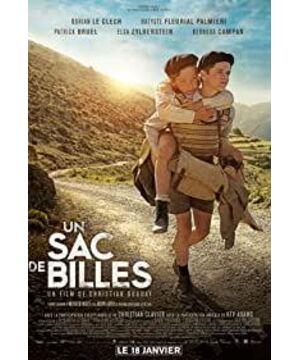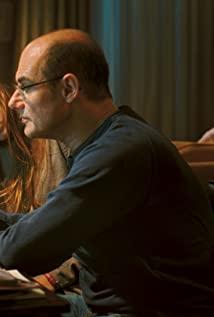2017 ) The 2017 film "Un sac de billes" is about the second time that the famous French writer Joseph Rofu's autobiographical novel "Bag of Bills" has been published. screen. The first adaptation was released in 1975. The earlier version also had a translated title called "Childhood of Misery", which seems to be suspected of biasing the temperament of the original.
It is difficult for people in times of war not to suffer. For children, their lives where they could play and play are completely shattered. One second they may be playing innocently and playing, and the next second they fall into a situation of life and death, or life and death. He lost his life even when he was still ignorant about what war was really about.
In the face of suffering, Joseph Roff's creative attitude seems to be relatively positive. In the preface to his book "Bag of Bullets," he says: "This book is not the work of a historian. It is my Childhood memories of that year, about my adventures during the French occupation. Thirty years have passed (the writer was born in 1931), and memory can change some details of the story as well as forgetting, but the main thing is still fresh : Its authenticity, its intimacy, its humor and panic are all vivid in my eyes." After
watching the latest film version of "A Bag of Marbles", the audience seems to feel that this version is more faithful to the original. , both authenticity and intimacy, witty and panic appear throughout the film from time to time, and fully and meticulously reproduce the main storyline and context - two young Jews who grew up in Paris in German-occupied France. Brothers Maurice and Joe, separated from their parents and brothers to escape the capture of the Nazis, traveled across France to meet in Nice. However, the good times did not last long. The short and sweet reunion was strangled by the pace of German occupation, and the two brothers lived independently again. , encountered all kinds of hardships and tribulations, waiting for the extraordinary experience of returning to Paris for family reunion...
In the process of escaping, the brothers experienced many thrilling tests, and gradually showed their witty and sensitive side, and their good wishes to reunite with their families filled them with courage. Of course, if there were no kind-hearted people who were strangers along the way to come forward to help, the two brothers would have encountered something unexpected long ago. In this part, both the novel and the film show the nobility of human nature in extreme situations, such as the doctor who examined the brothers' bodies, kept their secrets, wrote the examination conclusions that were beneficial to them, and the doctor himself However, he was sent to a concentration camp because of his Jewish identity. Before leaving, he was still taking care of the sick Joe, leaving the chance to give birth to young people... Another example is the priest who protected the brothers on the train, holding a fake birth certificate A priest in Nice who ventured to a Nazi officer to "fish" the brothers... In some cases, humans can expect the kindness of strangers.
It can be said that this film is more down-to-earth, expressed in solid details, looking at France during World War II and the various people at that time from the perspective of a child, retaining the inner activities and true feelings of children. Like the novel, the film truly reflects the French wartime social conditions and people's inner world from one side. Like what the pro-Germans did, and like what the resistance groups did. The film doesn't focus much on the pro-German faction, but it's the finishing touch. When Joe finally called out that he was Jewish, the owner of his part-time job shop, the pro-German man's facial expression was wonderful, and his heart must have been broken. , and the young actor Baptiste Fleurier, who played Joe in the film, also performed well.
Some paragraphs of the film are somewhat plain and straightforward, but from time to time sudden situations have the effect of adjusting the rhythm, and some of the rhythms are also well-tuned, not only emotionally released, but far from sensational, the final reunion, also With a little regret.
At the end of the film, the appearance of the elderly brothers in reality made the audience sigh deeply-recalling the past, when people reflect on the war, what else do they need to reflect on?
(magazine appointment)
View more about A Bag of Marbles reviews











